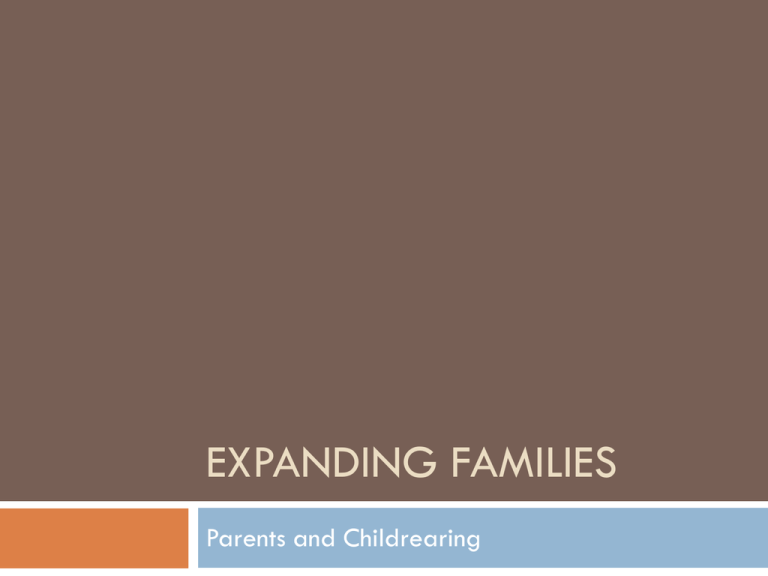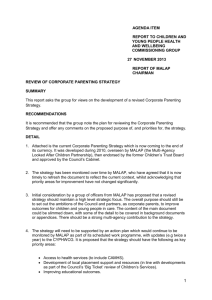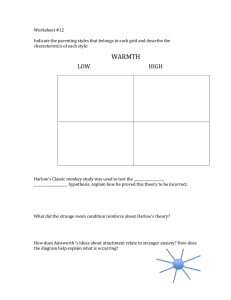Expanding families - your own free website
advertisement

EXPANDING FAMILIES Parents and Childrearing “There is no stage that brings about more profound change or challenge to the nuclear and extended family than the addition of a new child to the family system” (Bradt, 1989) Transition to parenthood Normative event full of many transitions Couples have to negotiate roles as primary caregivers May experience a decrease in marital satisfaction Change in finances (parental leave, costs assoc. with babies, child care costs etc.) EI = 55% of income and is subject to taxation. Difficult to make up financial losses associate with first years of parenting a new child Transition to parenthood Relationships Systems theory sees this transition as a major shift in family unit. Relationships with extended family are rebuilt. Relationships with friends can become strained Workplace roles are renegotiated. Generally it is the woman who provides childcare however there is an increase in the number men taking on these roles (usually report greater marital satisfaction) Parent-Child Relationships Attachment is defined as the behaviours that represent the need of the infant to attain and maintain proximity and protection with an available and responsive caregiver Freud saw the quality of attachment between mother and child laid foundation for personality growth and adaptability Attachment Most research has focused on mother-child bond however recent research has shifted focus to fathers Fathers of securely attahced infants more extroverted and agreeable, high levels of selfesteem and had positive marriageshttp://www.youtube.com/watch?v=Nx8R RIiP53Q Six Functions of the Family Function Maintenance and care of group members What does it look like Parents must provide for the physical needs of their children. They need to provide food, shelter, clothing, and medical care. We may need to provide care for other members of our families like grandparents or ill relatives. Addition of new members New members are added to families through the birthing process or adoption. Socialization of children Families teach children the skills, knowledge, values, and attitudes of the society in which they live. Social control of its members Families teach children how they are to behave and what is expected of them. Parents discipline children to teach them right and wrong. A variety of discipline techniques are used to control family members (i.e. grounding, removing privileges, time out). Production, consumption, and distribution of goods and services Family members work to earn money, which in turn is used to purchase the goods and services needed to maintain the family. Affective nurturance - love Families provide love. They work to meet the emotional needs of its members. Family Fundamentals Why are parent-child relationships important? The parent-child relationship is the child’s most important relationship. Factors that may influence this relationship include parental characteristics, the stability of the parents’ marriage, and the child’s characteristics. The perceived competency of the parents affects the effectiveness of their parenting. Older, more experienced, confident individuals are more competent parents. Socialization: Primary Groups & Secondary Groups Physical, emotional, psychological, and social development occurs through socialization. Families contribute to the development of their children’s self-esteem, personality, and negotiation skill set. In the context of their families, children learn their gender roles. How can/does this happen? Attachment Theory explains the infant’s need to be close to another person, and the security that results when this proximity is accomplished, as a normal, biological expression of social beings. Socialization: Primary Groups & Secondary Groups Early parent-child relationships establish the pattern for how a child experiences interactions with others later in life. Children develop and gain independence with the encouragement and care of their families. Children learn appropriate behaviours from the teaching of their parents, but they also learn implied lessons through observing people's interactions to others and their reactions to various situations. Families prepare young children to participate in other socializing institutions, secondary groups, such as schools, peers, media, organizations, and institutions. What are Secondary Agents? Corporations As Agents of Socialization Mickey Mouse Monopoly Beauty and the Beast Influences on Parenting Styles Internal Factors: Personality: Your attitude toward life and its challenges will determine how you approach the challenges of parenting HOW??? Are you an optimist or a pessimist? How do you handle your anger? Are you affectionate? Your feelings about children: A parent's beliefs about children and childrearing will impact on the way in which they interact with children. These beliefs are often the result of our own experiences as a young child and as a member of a family. How??? Parenting values: It is important to consider what you value before you become a parent. What is more important - your family or your career? How do you like to spend your free time – with your friends or family? Influences on Parenting Styles Continued External Factors: Social and Cultural Influences: Our values are deeply rooted in culture. Cultures have different values and in turn influence parenting practices. Parenting is influenced by the culture in which you were raised & the cultural practices you choose to follow. Economic conditions: Unemployment, interest rates, & taxes all impact on the amount of money available to families to raise their children. Social policies: Government policies will impact on parenting. Laws have been established to protect children from abuse. Other laws relate to child custody and support. Governments also provide support to families in a variety of ways through specialized and subsidized programs. Parental roles and social expectations: As society evolves so do expectations on parents. Women in the workforce, men taking more active roles in parenting including paternity leave. Authoritarian Authoritative Permissive Uninvolved Which parenting style is this? Youtube videos What parenting style did your parent/s use? What parenting style would you adopt? REVIEW: Parenting Styles







